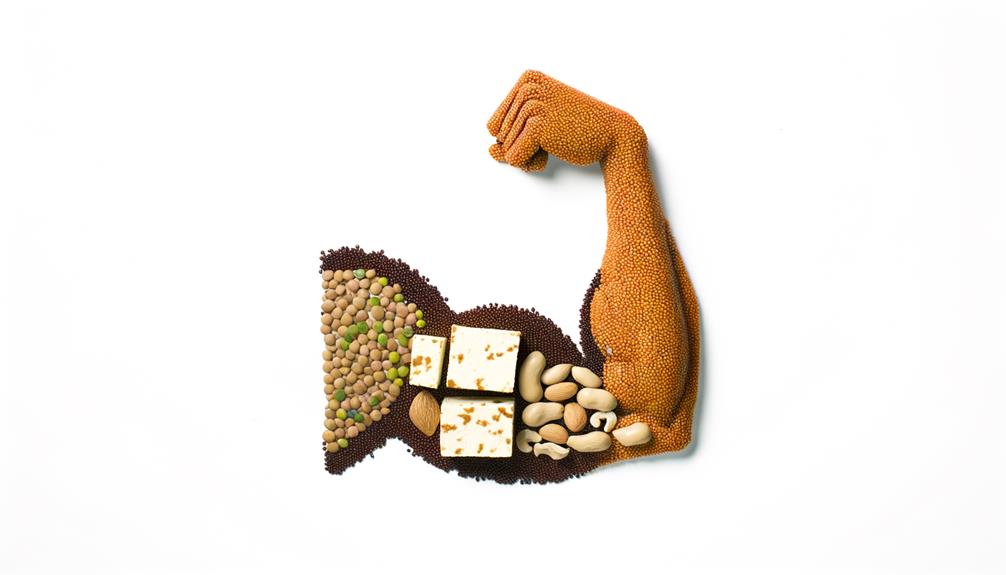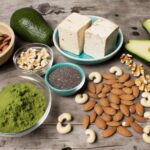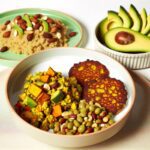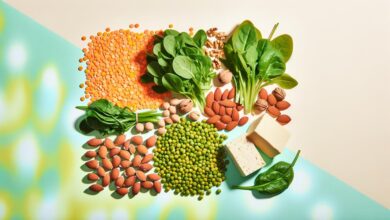You've probably heard the saying, "You are what you eat," and when it comes to bodybuilding on a plant-based diet, this couldn't ring truer. As you strive to sculpt your physique, the fuel you choose has a profound impact not only on your performance and recovery but also on the world around you. You're committed to building muscle while upholding ethical values and respecting cultural dietary choices, and that means finding the best plant-based proteins that are as kind to the earth as they are to your body. Navigating through the myriad of legumes, grains, nuts, and seeds can be daunting, yet within them lies the key to a nutrient-rich diet that supports both your bodybuilding goals and your ethical standards. Stay with us as we unveil the top contenders in the plant-based protein lineup that could revolutionize the way you think about muscle building and nutrition.
Key Takeaways
- Plant-based proteins are potent and ethical alternatives to animal-derived sources, providing necessary building blocks over time.
- Lentils, chickpeas, black beans, and split peas are top legume protein sources that are versatile, protein-rich, and suitable for various cuisines.
- Quinoa is an essential grain for muscle building as it is a complete grain with all nine essential amino acids and is rich in fiber, iron, and magnesium.
- Nuts and seeds like almonds, chia seeds, hemp seeds, and pumpkin seeds are protein powerhouses that support muscle recovery, nutrient absorption, immune function, and muscle growth.
Understanding Plant-Based Proteins
To effectively fuel your muscle-building journey, it's crucial to understand how plant-based proteins can serve as potent and ethical alternatives to animal-derived sources. These nourishing powerhouses honor both your body's needs and the earth's rhythms, embodying a symbiosis of health and compassion. You're not just nurturing yourself; you're also extending respect to the planet and its inhabitants.
Delving into the science, plant-based proteins often boast impressive amino acid profiles, though some may be lower in certain essential amino acids. Fear not, for through the art of combining different plant sources, such as beans and rice, you craft a complete protein, rich in all the amino acids your muscles crave. This is where your culinary creativity can shine, blending culture and nutrients in every meal.
Understanding protein absorption rates is also key. While plant proteins may digest at varied paces compared to their animal counterparts, they still provide your body with the necessary building blocks over time. It's a gentle invitation for you to listen to your body's unique rhythm and respond with tailored nourishment.
Top Legume Protein Sources
Now that you're acquainted with the basics of plant-based proteins, let's explore legumes, a group of powerful protein-packed plants that support both your muscle-building goals and ethical eating practices. Legumes are not only rich in nutrients but also contribute to a more sustainable and compassionate food system, aligning with a desire to nourish and serve both oneself and the community.
Here are some top legume protein sources to include in your diet:
- Lentils – A versatile staple that can be easily incorporated into soups, stews, and salads. They're a powerhouse of protein and fiber.
- Chickpeas – Perfect for making hummus or as a hearty addition to any dish, chickpeas offer a substantial protein punch.
- Black Beans – These beans are not only protein-rich but also full of antioxidants, and they work well in a variety of cultural cuisines.
- Split Peas – An excellent protein source that can be transformed into a comforting split pea soup or a savory dal.
Don't forget legume preparation tips such as soaking or sprouting to enhance digestibility and nutrient absorption. Also, consider the soy diversity benefits – tofu, tempeh, and edamame offer varied textures and flavors while packing a high-protein punch, making them a perfect fit for any meal plan aiming to serve the body and planet alike.
Essential Grains for Muscle Building
Moving beyond legumes, incorporating essential grains into your plant-based diet can significantly enhance your muscle-building regimen, offering a spectrum of nutrients while upholding your commitment to ethical eating. Grains are not just energy sources; they're cultural staples that, when chosen wisely, contribute to a balanced diet rich in essential amino acids necessary for muscle recovery and growth.
One stellar grain to consider is quinoa. Renowned for its complete grain amino profiles, quinoa contains all nine essential amino acids, making it a powerhouse for muscle synthesis. The quinoa muscle benefits extend beyond its protein content—rich in fiber, iron, and magnesium, it supports overall health, which is crucial for your body's recovery processes.
When you embrace grains like quinoa, you're not just nurturing your body; you're also respecting the environment and the well-being of other living creatures. By choosing ethically sourced grains, you contribute to a more sustainable and compassionate food system. It's a win-win—you serve your health goals and the greater good.
Nut and Seed Protein Powerhouses
Harnessing the robust protein profiles of nuts and seeds can elevate your plant-based bodybuilding diet to new heights, offering dense nutrition and ethical sourcing to fuel your fitness journey. These gifts of nature not only support your muscle-building goals but also resonate with a commitment to kindness and compassion towards all beings. Here's how you can integrate them into your regimen:
- Almonds: With a generous amount of protein, almonds are a staple in the health-conscious community. They're also rich in Vitamin E, which supports muscle recovery.
- Chia Seeds: These tiny seeds pack a powerful punch, complete with omega-3 fatty acids that can aid in nutrient absorption and reduce inflammation.
- Hemp Seeds: Offering a complete protein profile, hemp seeds are a must for muscle synthesis and repair, and their versatility makes them easy to incorporate into meals.
- Pumpkin Seeds: Don't overlook these seed varieties; they're fantastic for their zinc content, which is vital for immune function and muscle growth.
Integrating these nut and seed protein powerhouses into your diet not only fortifies your body but also aligns with a lifestyle that cherishes our planet's resources. By choosing these ethical sources of nutrition, you're contributing to a culture of care and respect, all while optimizing your plant-based bodybuilding journey.
Plant-Based Protein Powders
While integrating nuts and seeds into your diet provides a solid foundation, plant-based protein powders offer a convenient and concentrated source of protein to support your bodybuilding endeavors. These powders are not just a quick fix for meeting your nutritional needs; they're a testament to the power of ethical choices and the richness of nature's bounty. They are crafted to enhance protein bioavailability, ensuring that your body can easily absorb and utilize the nutrients to repair and build muscle.
You'll find that plant-based protein powders come in a delightful flavor variety, catering to your palate while you nourish your body. Whether you're whipping up a post-workout shake or enriching your morning smoothie, these powders blend seamlessly into your routine. They embody a cultural focus, often sourced from diverse plants like peas, brown rice, hemp, and soy. This not only supports sustainable farming practices but also provides you with a spectrum of amino acids essential for muscle growth and recovery.
Choosing plant-based protein powders aligns with a commitment to nurture both your body and the environment. It's a choice that serves the greater good, offering up a nutrient-rich alternative that stands shoulder to shoulder with traditional protein sources in your quest for bodybuilding excellence.
Frequently Asked Questions
How Does the Rate of Protein Absorption From Plant-Based Sources Compare to That From Animal Sources, and Does This Affect Muscle Recovery and Growth?
You're comparing apples to oranges when it comes to digestion speed and amino acid bioavailability. Plant proteins often absorb slower, which can impact your muscle recovery and growth in your service-focused lifestyle.
Are There Any Common Plant-Based Protein Sources That Could Potentially Cause Allergies or Intolerances, and How Can One Identify and Manage Them?
You might discover allergies to soy or nuts. Allergy testing can confirm suspicions, while cross-reactivity awareness helps avoid related triggers. Managing these ensures a nutrient-rich, ethical diet that serves your body and community.
What Is the Environmental Impact of Sourcing Plant-Based Proteins Compared to Animal-Based Proteins, and How Can Consumers Make Sustainable Choices?
Sowing seeds of sustainability, you'll find plant-based proteins are gentler on Earth than animal counterparts. Embrace protein efficiency and ethics; choose nutrient-rich legumes and grains to nourish others and protect our planet.
How Can Someone on a Plant-Based Diet Ensure They're Getting a Complete Amino Acid Profile in Their Meals Without Using Supplements?
To ensure a complete amino acid profile, you'll want to practice protein pairing. Quinoa's benefits shine, offering all essential amino acids, supporting your commitment to a nutrient-rich, ethical lifestyle that serves others.
Can Plant-Based Diets Provide Enough Protein for Extreme Bodybuilding, and Are There Any Successful Bodybuilders Who Follow a Plant-Based Diet Exclusively?
You can build muscle on a plant-based diet; it's nutrient-rich and ethical. Prioritize protein bioavailability and consider vegan supplementation. Many bodybuilders thrive plant-based, serving as an inspiration to the fitness community.







